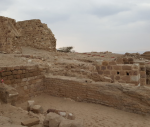You are here
Pompeo’s message to Netanyahu: No to unilateral annexation
May 12,2020 - Last updated at May 12,2020
US Secretary of State Mike Pompeo will travel to Israel on Wednesday for a one-day visit on the same day that a new twin-headed government will be sworn in, ending more than a year of political impasse that saw three inconclusive elections. This will be Pompeo’s first foreign trip since the US adopted health measures, including total lockdown in some states, to confront the coronavirus outbreak. The timing and nature of the visit are indicative. In addition to meeting with incumbent Prime Minister Benyamin Netanyahu and his partner/rival Benny Gantz, Pompeo, it is now believed, will deliver an important message regarding the possible annexation of parts of the West Bank and the Jordan Valley.
That message, this author has learned from multiple sources, calls for caution and postponement of the controversial move. While Pompeo will reiterate his administration’s staunch support for Israel, he will also stress the need to avoid unilateral steps at this juncture. Whether this position will be made public or not remains to be seen. Pompeo will address the fact that Donald Trump’s Middle East peace vision, the so-called deal of the century, revealed last January, should be dealt with as a complete package.
This would be the first time that a clear position on annexation is made by the Trump administration. Last month, Pompeo said that the issue of annexation is a decision to be taken by Israel alone, and that his administration will deliver its position privately to the Israeli government. That ambiguous statement was interpreted as giving a green light to the new Israeli government to decide when and how to proceed on possible annexation.
Then US ambassador to Israel, David Friedman, also made a number of contradictory statements on the subject. While he publicly supported a unilateral move on the issue, he was reported to have told Israeli officials that the Trump administration considers its vision as a peace plan and not as an annexation plan. Then one unnamed senior US official was quoted by Axios to have said that annexation is only part of the plan and it should be accompanied by recognition of a Palestinian state through negotiations between Israel and the Palestinians.
Netanyahu’s deal with Gantz gives him the right to submit an annexation proposal, as early as July, to the government and/or to the Knesset. Despite Gantz’s Blue and White reservations regarding that move, Netanyahu’s proposal is expected to pass without much objection from lawmakers. But it is important to note that the Israeli public remains divided over the issue. Retired security and army officials have warned Netanyahu that annexation will jeopardise Israel’s national security. Israeli pundits, as well as a number of US Jewish organisations, have also warned that annexation will end Israeli democracy while turning Israel into an apartheid state.
Arab states have rejected Trump’s peace plan and, along with the EU, the UN, Russia and China, maintained that the two-state solution remains the only path to a just and lasting peace between Israel and the Palestinians. Palestinian President Mahmoud Abbas appealed to Trump to review his position but refused to resume contacts with the White House; terminated when the US recognised Jerusalem as Israel’s capital. The US had called on Abbas to submit a counter offer to the peace plan.
But last week, this author has learned, the PA sent what was described as a “white paper” to the US, in addition to the International Quartet, outlining its position, as well as principles, on reaching a peace settlement with Israel. The two-page unsigned letter was written by chief Palestinian negotiator Saeb Erikat and is believed to be the first official contact between the Palestinian Authority (PA) and the White House in more than two years. Sources tell me that White House considered the move as a goodwill gesture.
Coinciding with these events, this author has learned that Jordan, one of the most vocal critics of annexation especially where the Jordan Valley is concerned, has delivered a message to the UN Security Council arguing that annexation of the Jordan Valley will be treated as a violation of the Jordan-Israel peace treaty. Jordan’s Foreign Minister Ayman Safadi made clear that annexation of the Jordan Valley violates the delineation of borders between Jordan and Israel as stipulated in the treaty. His argument was not made public to date.
It is worth noting that Saudi Arabia’s cabinet last week also stressed that the Palestinian cause remains a “central issue” for Arabs and Muslims, while referencing the results of the emergency Arab League meeting which condemned the Israeli authority’s plans to annex any Palestinian land.
The White House is aware that unilateral annexation of West Bank territory will only complicate matters and will fail to end the conflict. Renewed contacts between the Palestinians and the US at this juncture are of paramount importance. Efforts must be made to foil Netanyahu’s attempt to destroy the two-state solution and prolong the region’s most challenging conflict. The US is the only power that can stop Netanyahu from taking this dangerous step.
Osama Al Sharif is a journalist and political commentator based in Amman













